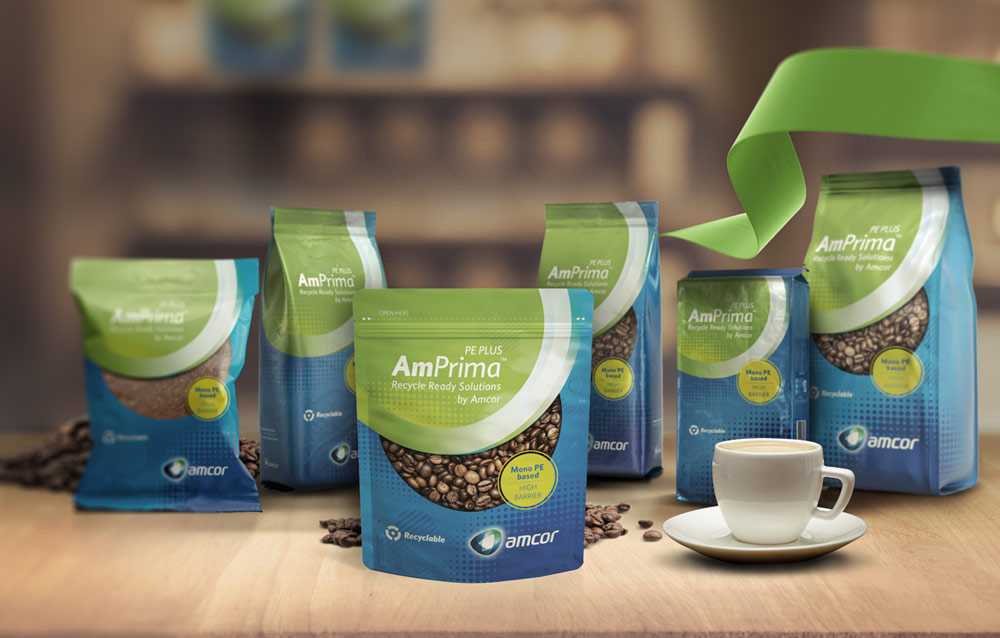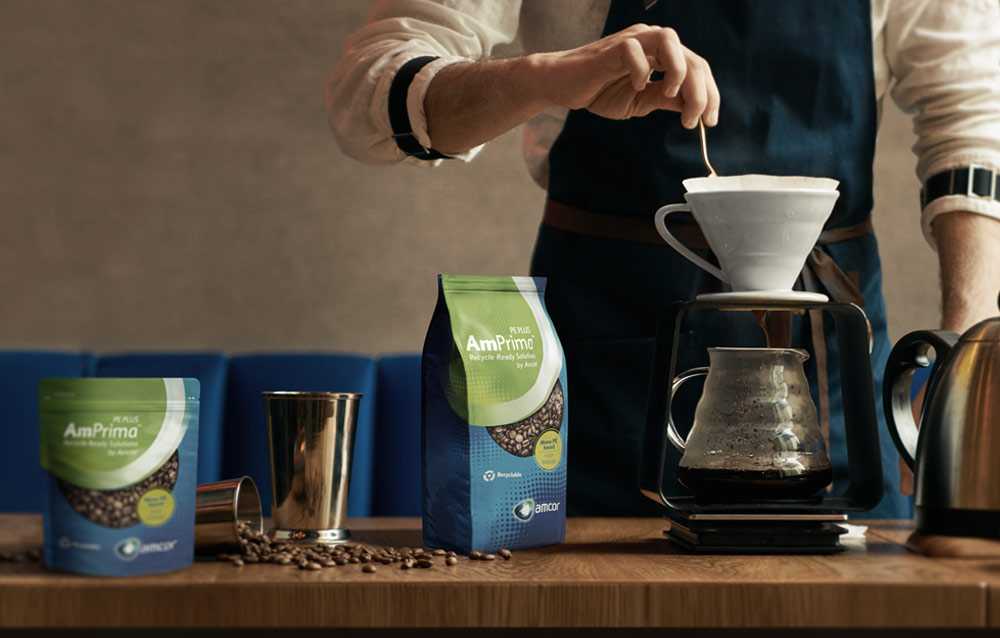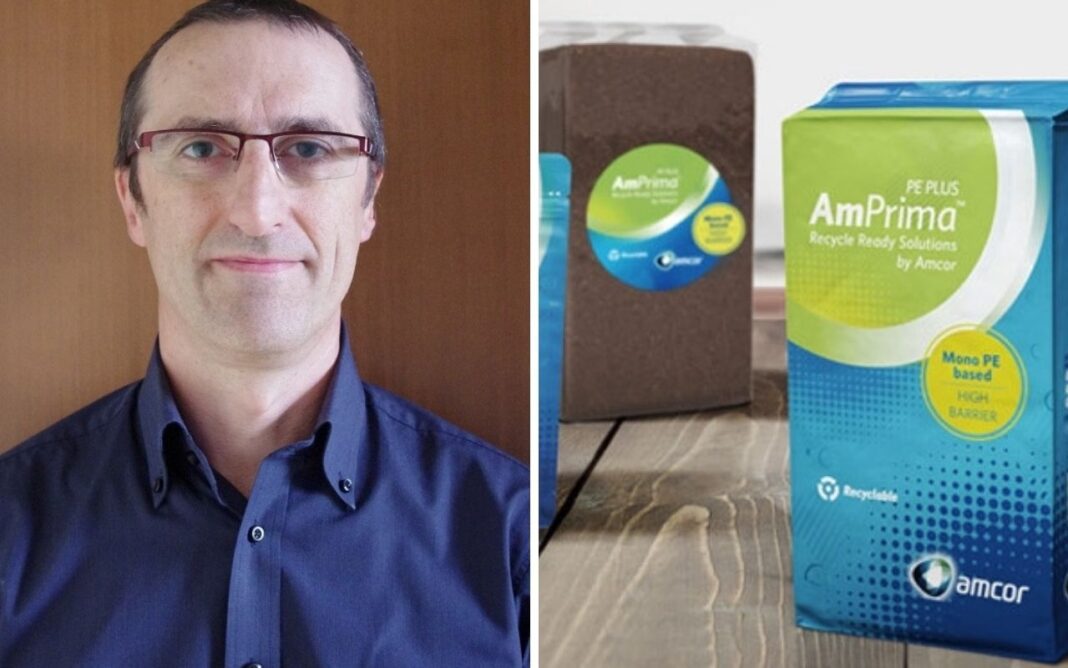ZURICH, Switzerland – Amcor is a global leader in developing and producing responsible packaging solutions. The company is focused on making packaging that is increasingly light-weighted, recyclable and reusable, and made using an increasing amount of recycled content. We talk about the current state of the market, faced with new challenges posed by changes in consumption and end-user demands, towards more environmentally sustainable solutions with Giorgio Dini – marketing manager Coffee AFEMEA.
The world of packaging is changing a lot: what has driven this revolution?
“A packaging revolution is occurring as the value chain focuses on increasing recycling
and reducing greenhouse gas emissions. Structural changes are also coming on the front
of legislation with various directives, taxes, and increasing EPR fees that also add to this
packaging revolution.
The focus of these changes can be summarized as a focus on circularity – designing
packaging to be reusable or recycled, increasing the collecting of the packaging, the
recycling of the packaging and including recycled content in packaging – all of this while
reducing the carbon footprint. Finally, we know that consumers and other stakeholders are demanding circularity frompackaging and prioritizing brands that focus on more sustainable solutions.”
How can the carbon footprint of packaging be measured with your your Amcor’s ASSET lifecycle assessment service?
“Carbon footprint is a key indicator to compare the sustainability performance of a pack
vs. others. Our Asset™ tool is certified by Carbon Trust and allows Amcor to calculate
various environmental indicators such as carbon footprint, non-renewable energy
consumption, and water consumption.
With thisstreamlined Life Cycle Assessment capability we support our customers to take
informed decisions when they start new developments and also help them to draw their
sustainability roadmaps.
An example of our Asset™ tool for R&G coffee can be accessed here (example, not the
complete report). The tool is providing comparative sustainability position according to
selected End-of-Life scenarios (rates for incineration, landfilling, recycling can be set).”
Amcor has just launched a new product for coffee beans and ground coffee: AmPrima™ PE Plus. What is it?
“Amcor is focused on providing packaging that can be recycled. AmPrima™ PE Plus for
Coffee, is a mono-polyethylene high barrier solution, optimized for coffee and providing
several advantages. This recyclable product is already in use by one of our partner
customers and is going to expand to those countries where the demand for this type of
mono-material packaging is high.
AmPrima™ PE Plus is taking advantage from a proprietary barrier coating technology
paired with a specific sealant: this brings advantages with regards to product preservation and filling performance. In addition, it has been designed to avoid un-necessary plastic weight and is better for the environment.
AmPrima™ PE Plus for Coffee comes with a certificate of recyclability issued by HTP
Cyclos and outperforms the CEFLEX guidelines, reference in Europe.”
Instead, can you tell us the technical specifications of two packages you have experimented with with Meira and Lofbergs?
“The sustainability agenda of these customers is focusing on carbon footprint reduction;
in order to achieve this, we have developed packaging solutions that incorporate bio-
based resins. At the same time we provide the required barrier because our mantra is, that
we do not ask customers to compromise on coffee quality or aroma preservation.
With Lofbergs we have supplied a bio-based specification that can be recycled, while the
case of Meira is different, because they replaced an aluminium-based packaging with our
alu-free & bio-based solution as intermediate step in their sustainability roadmap.
Thanks to long-term expertise and connection across filling machine manufacturers,
Amcor is able to provide more sustainable products while matching the highest performance on filling lines.”
How can brands that work with you communicate their commitment to reducing emissions? collaborating with you?
“In general, Amcor is supporting customers with insights on labels and claims that can be
printed on pack; this is a delicate topic that is also involving regulatory aspects. In addition, Amcor has an agreement with Carbon Trust so that our customers can license
and print the Carbon Trust logo at more convenient rates than they would need to pay
going on their own.”

Are consumers more careful and also willing to pay more for packaging solutions that have less impact on the environment?
“Today’s consumer is much more careful about the environmental impact of packaging,
this is coming partly from an increased focus of media on plastic pollution and partly
because they notice a clear excess of plastics on some food products. Various surveys
and market analysts are telling us that often the consumer is disposed to pay more for
food and beverages that are packed with a better sustainability position. This is especially
true for the Generation-X and we have to recognize there are multiple dynamics hitting the
FMCG market.”
On the subject of capsules: what are the greenest solutions that Amcor offers its partners?
“Amcor is a reference supplier in the capsules segment. Our product offering covers a
wide spectrum across multiple systems. The aluminium capsule is meaningful with
regards to sustainability as the aluminum is widely collected and recycled. We see a trend
for the compatible capsules shifting from plastic to aluminium. Finally, the compostable is
an option and Amcor will launch a home compostable lid with barrier by end of the year.”
Which companies are the most virtuous in terms of sustainability? Is the market in Italy still lagging behind?

“The coffee market really has peculiar dynamics: for several years, the sustainability
focus of the roasters was on coffee sourcing with programs like Fairtrade, Rainforest
Alliance etc., while packaging did not change much for many years. In the last couple
years coffee brands realize they needed to act on the packaging side too. We do not see
the Italian brands are behind, in general I would say the market leaders are more active setting up their strategy while others are in a phase of understanding which solutions can be taken, which claims can be done, what is the impact on their operations, if they need to invest in new lines or in retrofitting. Also very important, communication needs to properly support the sustainability agenda – this is probably where many brands are still struggling.”
Which direction is the future of packaging going and will it go in the coming years?
“These are very dynamic times! We are in a phase where the infrastructure needs to be
upgraded and scaled up, with regards packaging waste collection, sorting and recycling. Still too much packaging is incinerated (with or without energy recovery) or even landfilled. Sorting and recycling technologies are also evolving and this brings good hopes for the future in terms of circular economy.
In parallel, legislation is is also an important driver. While the plastic taxes emerging in a
few countries will create incentives to increase recycled content, the increasing EPR fees
and their modulation by EU directive will support the development and continuation of
collection, sorting, and recycling infrastructure for packaging waste.
Both the EPR fees and plastic taxes can potentially create incentives to shift between
material categories, for example such as plastic and paper, but the overall picture needs to be taken into account including packaging total cost of ownership and environmental
performance conducted with life cycle assessments.”
About Amcor
Amcor is a global leader in developing and producing responsible packaging for food, beverage, pharmaceutical, medical, home- and personal-care, and other products. Amcor works with leading companies around the world to protect their products and the people who rely on them, differentiate brands, and improve supply chains through a range of flexible and rigid packaging, specialty cartons, closures, and services. The company is focused on making packaging that is increasingly light-weighted, recyclable and reusable, and made using an increasing amount of recycled content. Around 47,000 Amcor people generate US$12.5 billion in sales from operations that span about 230 locations in 40-plus countries.















